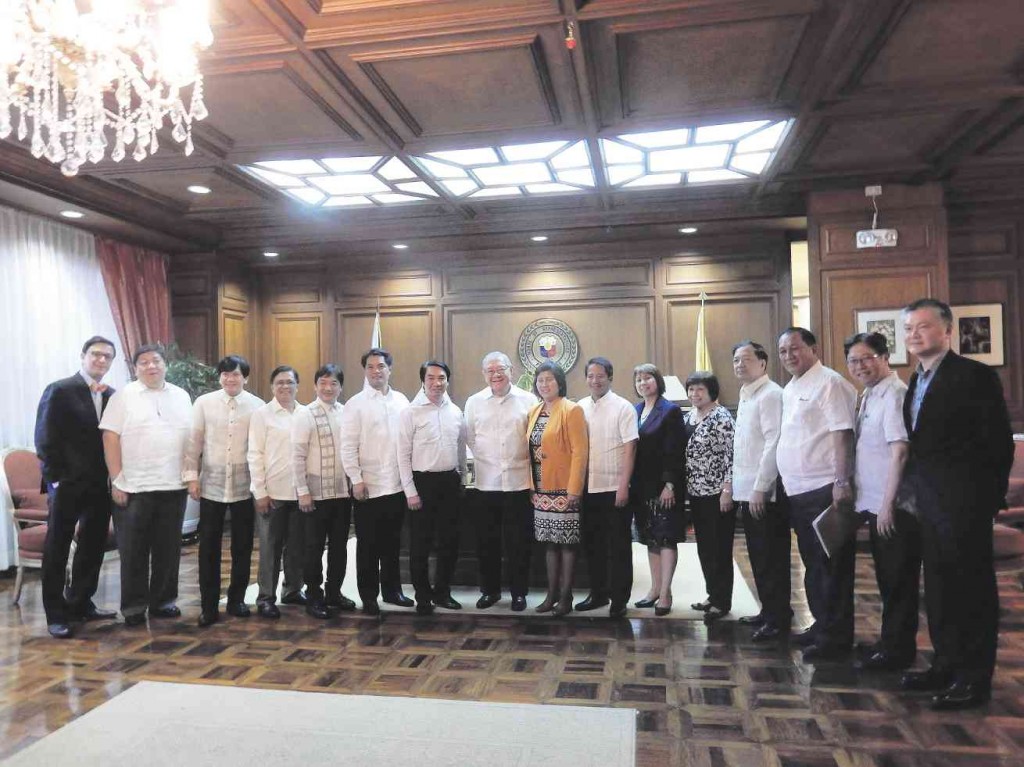Summit to tackle housing crisis

HOUSE Speaker Belmonte (8th from left) welcomes SHDA executives led by president Armenia Ballesteros (9th from left) who looks forward to closer partnership to solve the country’s housing problem. Joining the two are (from left) Rep. Romero Quimbo, SHDA board adviser Willie Uy, Representatives Winston Castelo, Raneo Abu and Alfredo Benitez, SHDA chair Ricky Celis, 1st VP Rodel Racadio, 2nd VP Fely Ramos and corporate secretary Lillian Reyes, Rep. Benjamin Asilo, Rep. Benhur Salimbangon, SHDA governor George Siy and national auditor Jeffrey Ng.
Of the 1.6 billion people living in inadequate shelters around the world, the nonprofit organization Habitat for Humanity said that 1 billion live in informal settlements while another 100 million are without homes, that is, they sleep on pavements, in parks, under bridges if not in abandoned structures.
The same organization warned that this global problem will continue to intensify as more people head to urban centers in search of better livelihood opportunities.
These new migrants are expected to further spur the growth of informal settlements in cities, worsening the problems of overcrowded neighborhoods, inadequate housing, pollution, and poor access to clean water, sanitation and other basic social services.
Major challenge
Indeed, this is a major challenge for the Philippines wherein 44 percent of the population—that’s about 44 million Filipinos—live in informal settlements, according to Real Equity for All (formerly Homeless International), a UK-based international development organization.
As early as last year, Negros Occidental Rep. Albee Benitez, who chairs the House committee on housing and urban development, recognized the need to address this challenge, especially of informal settlers located in Metro Manila.
In consultation with Sen. Joseph Victor “JV” Ejercito, chair of the Senate committee on urban planning, housing and resettlement, the World Bank and a number of NGOs, Benitez seeks to find a way how to address this challenge.
What developed afterward was the formation of a housing summit, a series of consultations involving technical working groups that will convene from March to October this year to come up with a policy framework for an inclusive and sustainable housing development.
Policy reforms lined up for the upcoming summit will cover land conversion, financing schemes particularly for in-city housing projects, government involvement in socialized housing, disaster mitigation, and urban development.
Technical guidance
Housing summit partner, World Bank, will lend technical guidance so stakeholders would be able to come up with a holistic national housing strategy as well as a policy paper, which is the intended output of the summit.
But while the initial concept for the housing summit seeks to address the 5.5-million housing backlog and the 584,000 families living in informal settlements in Metro Manila, the Subdivision and Housing and Developers Association (SHDA) raised the possibility of including other housing segments and not just informal settlements. “After all, this is a gathering of concerned agencies, experts and policymakers and we would wholeheartedly support whatever outcome this summit would create,” said SHDA president Armenia Ballesteros.
She added that without intervention, the housing backlog is expected to rise to over 6.4 million units by 2030. “In 2012, SHDA, in partnership with the University of Asia and the Pacific Center for Research and Communication, prepared the Housing Industry Roadmap of the Philippines: 2012-2030. This is in response to the challenge of the Board of Investments for the housing industry to produce a roadmap that will detail how the industry can address the housing backlog.”
Across all housing segments, SHDA estimates an average of 345,941 units will be needed per year while the country’s socialized housing need is projected to reach 1.58 million units between 2012 and 2030 based on SHDA’s New Housing Needs profile, according to SHDA chair Ricky Celis.